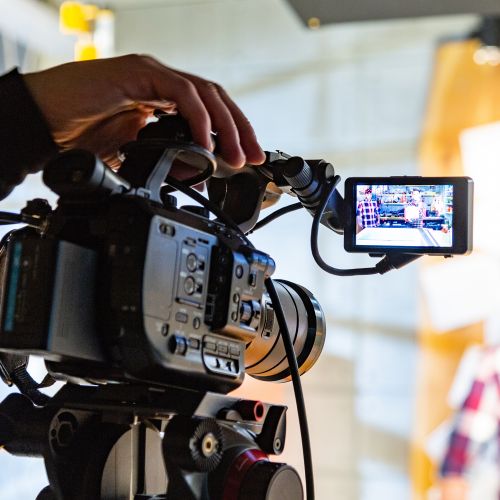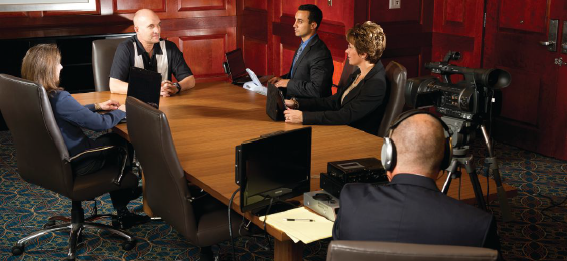The Role of Legal Videography in Depositions and Trials
Lawful videography has emerged as a necessary device in both depositions and trials, offering a diverse strategy to recording witness testaments. As lawful experts progressively acknowledge its value, it prompts a much deeper exam of exactly how these aesthetic documents can influence juror perceptions and trial outcomes.
Relevance of Lawful Videography
Legal videography plays an essential duty in the paperwork and presentation of depositions and trials. This specific area integrates technical abilities with lawful understanding to produce a reputable document of procedures that can considerably influence instance results. The aesthetic facet of lawful videography improves the understanding of witness testimony, allowing jurors and courts to observe not only the talked words however also the disposition, feelings, and body language of the witnesses.

The value of legal videography extends beyond the court room; it likewise plays a vital duty in maintaining evidence for future reference, whether for allures or additional lawsuit. Because of this, its integration right into the legal process is crucial for making sure a fair and exact representation of the facts, inevitably contributing to the search of justice.

Process of Legal Videography
While catching the subtleties of depositions and trials, the process of lawful videography entails numerous vital actions that make certain top quality, precise recordings. A professional legal videographer prepares by evaluating the instance products and recognizing the specific requirements of the deposition or trial. This preparation includes familiarizing themselves with the individuals and the context, which helps in catching pertinent details.
On the day of the recording, the videographer establishes the required devices, which usually consists of high-def electronic cameras, microphones, and correct lighting. Ensuring optimal angles and audio quality is essential, as it directly impacts the effectiveness of the recording. The videographer communicates with lawyers and individuals to develop procedures, making sure that every person comprehends the recording procedure.
Throughout the deposition or test, the videographer diligently videotapes the process, paying attention to both verbal and non-verbal hints. legal videography. This includes capturing the behavior and reactions of witnesses and attorneys. After the session wraps up, the videographer may edit the footage for clarity and conformity with lawful criteria, generating an end product that precisely reflects the proceedings for future reference and usage in lawful contexts
Advantages in Depositions
The unification of videography in depositions uses many advantages that improve the overall procedure of gathering proof. One main benefit is the capacity to capture witness testaments with visual and acoustic fidelity, providing a much more accurate depiction of the witness's behavior, tone, and body language. This multidimensional technique allows lawyers and courts to examine trustworthiness better than conventional written records alone.
Additionally, videographed depositions function as a powerful tool for maintaining testimony. Must a witness become not available for test, their tape-recorded deposition can be played in court, making certain that their evidence stays obtainable and appropriate. This facet dramatically reduces the danger of shedding crucial info that can impact case results.
Furthermore, the use of legal videography advertises far better prep work for attorneys. Evaluating video clip footage permits lawful teams to evaluate and fine-tune their methods, recognizing toughness and weaknesses in their cases. This preparatory advantage can cause even more engaging discussions in court.
Lastly, videography improves the general professionalism of the deposition process, instilling confidence in clients check out this site concerning the thoroughness of their legal representation. By leveraging innovation, legal experts can substantially boost visit this web-site the performance of depositions.
Influence On Trials
In numerous trials, the combination of videography can considerably influence the presentation of evidence and the jury's understanding. Legal videography catches witness statements and critical evidence in a dynamic style, allowing jurors to engage with the product on numerous degrees. This visual element enhances the storytelling facet of a test, supplying context and psychological resonance that conventional text-based evidence might do not have.
Additionally, video recordings can act as effective devices for impeachment during cross-examination. When disparities emerge in between a witness's prior statements and their court room testament, video clip evidence gives an unbiased referral that can persuade jurors' opinions. This immediacy and clarity can strengthen the reliability of an event's story while at the same time undermining opposing debates.
In addition, using videography can assist improve complex details, making it much more accessible to jurors who might struggle to realize complex information provided entirely via verbal testament. By integrating visuals with acoustic info, lawful videography can improve retention and understanding, ultimately affecting the court's decision-making process. The impact of videography in tests extends beyond plain aesthetic appeals; it plays a crucial function in forming the lawful landscape and results.
Future Trends in Legal Videography
As we look towards the future of lawful videography, a number of arising patterns assure click resources to reshape its function within the courtroom. One significant trend is the integration of man-made knowledge (AI) in video clip analysis and modifying - legal videography. AI can improve the process of determining essential moments in recorded depositions, allowing attorneys to swiftly access pertinent web content, consequently improving effectiveness in case preparation
In addition, the rise of virtual truth (VIRTUAL REALITY) and boosted fact (AR) technologies is expected to transform exactly how jurors experience proof. By submersing jurors in a substitute setting, these innovations can give an extra extensive understanding of complicated situations, resulting in more educated considerations.

Furthermore, the increasing demand for remote depositions, accelerated by the COVID-19 pandemic, will likely continue. Legal videographers will need to adapt to brand-new software program and systems to make certain premium recordings in virtual settings.
Lastly, the expanding focus on information safety and security will demand more stringent procedures for storing and sharing video proof. As the lawful landscape progresses, legal videographers should stay abreast of these fads to keep their significance and efficiency in the judicial process.

Verdict
In recap, legal videography offers a vital function in the judicial procedure, enhancing the honesty of depositions and trials. By catching the nuances of witness statements, this medium not just maintains necessary evidence yet also aids in offering info properly to jurors. The value of visual paperwork in evaluating integrity and helping with interrogation can not be overstated. As innovation continues to progress, lawful videography is poised to more transform its duty within the legal landscape.